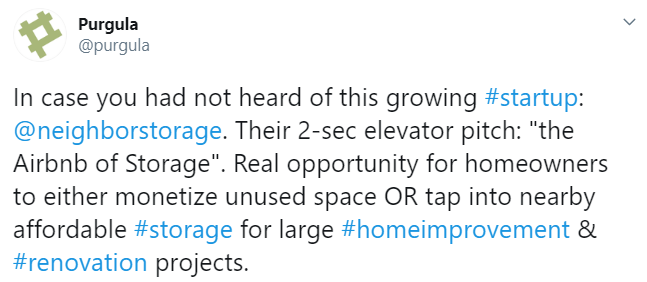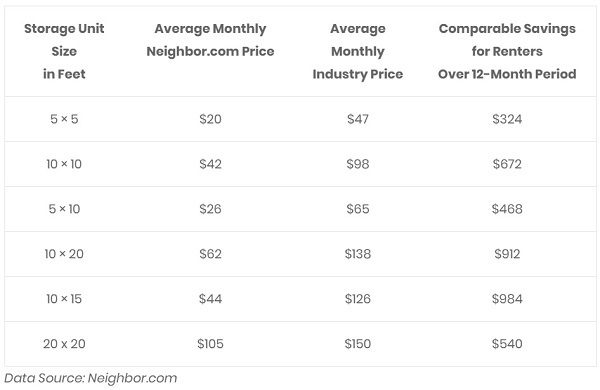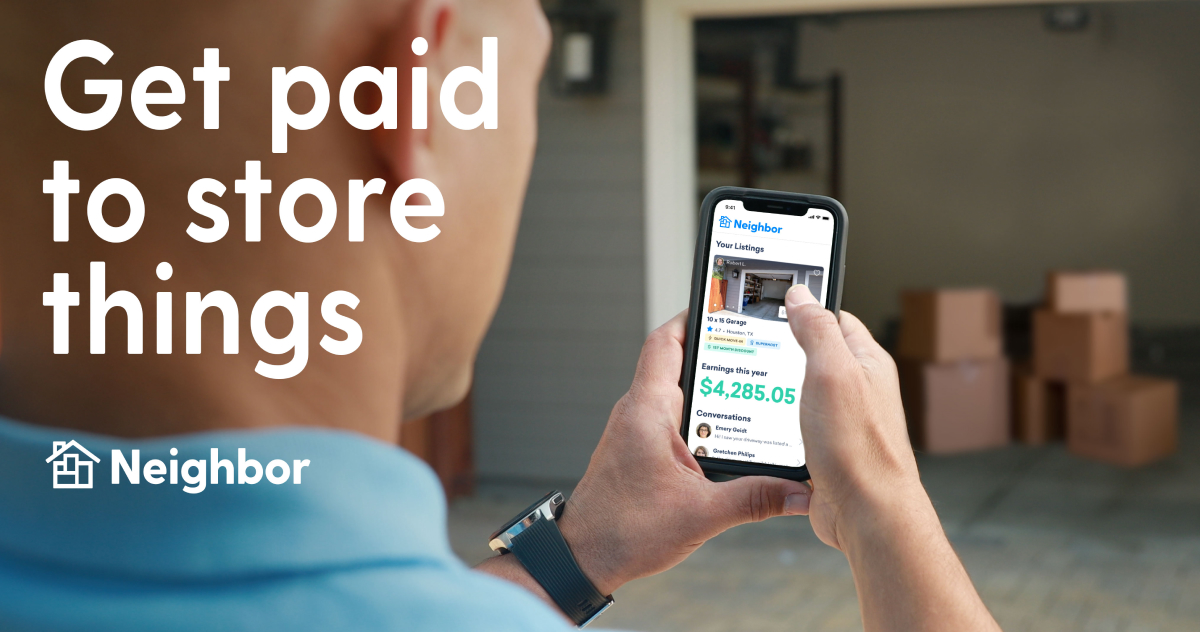Updated: September 27, 2022.
This post contains affiliate links that Purgula may receive a commission for referring you to them.
A new, disruptive startup, Neighbor.com, has been actively applying Airbnb’s business model to unused storage space on residential properties. We researched the company and its offerings so homeowners, who may be interested in becoming Neighbor Storage Hosts, can effectively decide if this opportunity is a good fit.
Table of Contents
- The Genesis of Neighbor.com
- Why You Should Rent Your Unused Space with Neighbor
- Requirements to Being a Neighbor.com Storage Host
- Sounds Great, But Who Has Extra Space?
- Rental Storage Opportunities by Life Stage Scenario
- Who Would Want to Rent My Space?
- Positive Self-Storage Market Trends
- The Benefits of Residential Self-Storage Spaces
- The Storage Hosting Process on Neighbor.com
- How to Become a Storage Host on Neighbor.com
- The Neighbor Sign-Up Process
- Best Practice Tips for Neighbor.com Hosts
- Safety and Security Protection For Storage Hosts
- Next Steps
- Neighbor Frequently Asked Questions (FAQs)
Also see:
The Genesis of Neighbor.com
As often happens, a frustrating experience inspired the company’s founding. A business partner of Neighbor’s founder and CEO, Joseph Woodbury, needed storage for three months while out of the country. Unfortunately, he was only able to find locations that were either too far away or too expensive.
“We’ve got all this empty space around and people that need the space,” Woodbury said. “Why are we building these big storage buildings?”
For those already familiar with Airbnb, Neighbor.com’s unofficial motto of being “the Airbnb of Storage” could be considered the world’s shortest and quickest elevator pitch. Within a few seconds of hearing this description, one can quickly comprehend that the company enables consumers to affordably and flexibly rent storage space at nearby residential properties.
Other homeowners, however, may instinctively think that this might be an easier and safer way to finally earn revenue from the lucrative “Airbnb” economy. Here was our immediate reaction posted on Twitter when first learning of Neighbor:

The self-storage startup can be defined as a peer-to-peer self-storage marketplace. Neighbor describes itself as an online community that connects and protects those who have extra space with those in need of storage. Their straightforward mission is to help their hosts passively earn extra money, while simultaneously helping their renters save money.
Why You Should Rent Your Unused Space with Neighbor
Click HERE to sign up for Neighbor today!
Requirements to Being a Neighbor.com Host
The two key requirements to becoming a Neighbor Self-Storage Host are:
1. Simply have an unused space in your home or outside on your property; and
2. Be legally responsible for your storage space, or have permission to rent out your space
Even if you may think that you currently do not have available or sufficient space, Neighbor.com’s flexible offerings may help to change your mind. For example, some enterprising hosts have been able to increase their profits by simply using colored tape on the floor of their garage to mark smaller storage areas, which in turn increased their occupancy rates.
The most popular types of storage spaces being offered are:
- Garages
- Driveways
- Closets
- Basements
- Attics
- Sheds
- Bedrooms
- Warehouses
- Outdoor lots for RVs& Boats
If you happen to have a different kind of storage space, Neighbor encourages you to list it, as you never know who might be interested in your space.
An example of creative thinking would be “garden space”, though this is not technically storage space. However, if the space could provide sufficient accessibility to the renter, the underlying platform could certainly support this type of contract. To be absolutely sure, however, we would strongly recommend contacting a Neighbor representative to confirm that this type of contract would be permitted and would not break any existing terms of service.
Additionally, when compared to being an Airbnb host, Neighbor offers two very attractive distinctions:
1. No strangers will stay in your home, just their approved belongings; and
2. The up-keep of the rented space and interactions with renters are relatively minimal – virtually qualifying as “passive income” for the host
Sounds Great, But Who Has Extra Space?
Through your life’s journey, you’ve likely found yourself with unused, yet potentially valuable, space in your home or on your property. Perhaps the adult children have finally moved out, or you’ve downsized to living on just one floor of your multilevel home for health reasons.
Perhaps you work from home and no longer need a second or third vehicle, thereby freeing up one side of a two-car garage or an outdoor parking space. Maybe you have a predictable work schedule and only need one of your parking spaces from 6PM-7AM on workdays.
Or maybe you have an unattractive, unfinished basement that you have been planning, hoping, wishing to someday, somehow remodel. The beauty of this type of scenario is that you could partially finance a future renovation by renting the unfinished space as storage. Basements are quite popular on Neighbor, for their size, climate-controlled space, and separation from the rest of the home.
All of these scenarios represent great opportunities to evaluate your income potential for your unused space. While deciding what to do with an inherited real estate property, for example, consider its storage income potential, before undergoing costly renovations necessary to prep for sale. Even your vacation rental could qualify as potential storage income.
Rental Storage Opportunities by Life Stage Scenario
Here are just a few “Life Stage” rental scenarios that could become lucrative, yearly income for you:
| Life Stage Rental Scenarios | Self-Storage Opportunities |
| Empty Nesters | Spare bedrooms and empty closets |
| Downsizers & Aging-in-Placers | Sectioned-off areas, such as upstairs |
| Landholders | RV Pads; Recreational Vehicles; Backyard Sheds; Unused Barns & Structures |
| Small Business Owners | Overnight, weekend, off-hour parking for nearby residents; Storage for nearby businesses |
| Vacation Rental Owners | Sheds for recurring vacationers and local businesses during in-season; internal storage during off-season |
| Off-Campus College Commuters & Nearby Residences | Intra-semester storage for non-local students (summer and winter breaks) |
| New Homeowners | Unfinished basements/attics |
| Remodelers & House Flippers | Sectioned-off areas unaffected by long-term renovation projects |
Who Would Want to Rent My Space?
As costs for traditional rental storage space increase and customer satisfaction remains at perennial lows, renters are seeking affordable, safe and convenient alternatives for storing their belongings. Whether for a few months (during summer holidays for college students and faculty, for example) or for longer periods of time (e.g. overseas job transfers), consumers are opting for non-traditional, low-cost storage options. In turn, Neighbor is striving to create a sustainable alternative to traditional storage facilities that becomes a “win-win” for both storage renters and homeowners.
The table below contains just a few examples of various lifestyle groups that represent prospective renters that likely would be highly interested in your storage offerings.
| Example Lifestyle Groups | Self-Storage Rental Needs |
| Renovators | Nearby safe and secure storage for materials and appliances for large renovation projects |
| College Students & Faculty | Storage during summer and winter breaks for non-local students and employees |
| Musicians | Nearby safe and secure storage for bulky, infrequently used equipment such as lighting, PA systems, backup instruments & equipment |
| Members of Clubs & Organizations | Storage for materials and supplies for recurring events and meetings: e.g. booster clubs; volunteer professional groups; alumni groups |
| Outdoor Recreationalists | Outdoor storage space for boats; ski jets; ATVs; water skis; snow mobiles; surfboards; hiking and camping gear; motorbikes; etc. |
| Athletes & Coaches | Safe and secure storage for sports equipment during off-season: hockey; skiing; football; etc. |
| Season Ticket Holders | Nearby parking for season ticket holders of adjacent sporting and performing arts venues |
| Urban Car Owners | Nearby off-hour parking (overnight and weekends) in mix-used city neighborhoods |
If you prefer to start with even more familiar prospects and have an established Facebook presence, you can use Neighbor’s proprietary feature, called “Store with a Friend”, that enables users to see which Facebook friends are hosts or renters with the company.
Positive Self-Storage Market Trends
Moreover, Neighbor.com’s business model will continue to benefit from several favorable consumer trends, including:
- An Aging Population and Aging-In-Place
- A growing percentage of retirees in the US are desiring to stay in their “forever” homes until death
- Part of fully adapting a home into a safe aging-in-place residence is enabling the home to generate flexible streams of recurring income
- Examples include: monthly rental rooms and apartments (ADUs); temporary vacation rentals like Airbnb; and now, thanks to Neighbor, temporary storage spaces
- Popularity of Tiny Homes
- A growing percentage of homeowners are opting to live in tiny homes for their affordability and efficiency (space, energy and on-going maintenance)
- One challenge to adapting to a tiny-home lifestyle is dealing with significantly less storage space. Enter Neighbor, which can offer flexible, nearby supplemental storage
- The Sharing Economy
- Disruptive startups like Neighbor are often categorized as being in the “Sharing Economy”
- “Sharing Economy” companies typically offer the following benefits:
- More Efficient Use of Under-Used Assets & Resources (Uber, Lyft & Airbnb)
- Market-Efficiencies (timing; pricing; personalization)
- Flexible, On-Demand Offerings
- Here are examples of popular “Sharing Economy” companies:
- Hospitality: Airbnb, Vrbo and HomeExchange
- Transportation: Uber and Lyft
- Crowdfunding: Kickstarter and Indiegogo
- Labor: Fiverr, TaskRabbit, and UpWork
- Furniture Rental Subscriptions: Feather, Fernish and Inhabitr
- Self-Storage: Neighbor
The Benefits of Residential Self-Storage Spaces
Residential homes offering self-storage are attractive to renters because they are:
- Convenient
Imagine your storage space being within a one-block walking vicinity versus a five-mile drive; or being available for one month between winter semesters within short walking distance to campus - Affordable
On average Neighbor encourages pricing that is approximately 50% lower than traditional rates for comparable spaces. For example, a 5×5 space averages $20 per month on Neighbor, while averaging $47 per month at traditional rental facilities - Flexible
Neighbor is facilitating more creative storage offerings in terms of: location; storage type; storage size; pricing; contract terms; accessibility; and timing - Safe
Neighbor states that burglary rates at traditional rental facilities are comparably high, as these types of businesses are often recurring targets for professional thieves. Conversely, homeowners have great incentive to invest in effective security technology and responsible practices that protect both their belongings, and that of their renters.
Affordability
To maintain a consistent value proposition of affordability, Neighbor encourages hosts to price their offerings close to 50% lower than traditional storage offerings. Here are industry averages they have shared on their blog:

The Hosting Process on Neighbor.com
- List for Free
- All listings are free, regardless of the storage space type or size
- Respond to Prospective Renters
- Always communicate through Neighbor
- Interested renters will reach out directly to hosts, possibly asking to view the space beforehand
- Hosts can see what the renter will be storing and decide to meet them in person before agreeing to anything
- Renter requests a reservation for your space
- The host communicates with the renter to confirm if their reservation has been accepted or not within 48-hours of the reservation request. If a response is not given in that timeframe, reservations are automatically declined
- Approve a Reservation
- Communicating through Neighbor, the approved renter is sent an email with the address of the space
- Renter moves their belonging in on the start date of the reservation
- Collect Payments
- Always receive payments through Neighbor
- Neighbor provides automated payments into your banking account
- End the Reservation
- The renter is responsible for ending the reservation after moving their stuff out
- The host doesn’t have to move anything or do anything to terminate the reservation
How to Become a Host on Neighbor.com
For those homeowners ready to monetize their available storage or parking space, simply click on “List Your Space“ to start the on-boarding process.
The Sign-Up Process
The first step is to get a ballpark idea of how much income your space may generate annually. To do so, enter your geographic location and type of space into the calculator. Keep in mind that not all storage types are listed in this preliminary check, so pick the closest option to your type of space. If the income potential looks worthwhile, then continue to provide your information.
The next step is to provide your name, email address and password. You can also use an existing Google account for convenience.
In all, the complete process to list your space is relatively quick, taking about 10 minutes, once you have your photos ready to upload. The platform can be accessed via the Neighbor mobile app or via Neighbor’s website.
The next screen addresses the issue of trust and asks that hosts abide by Neighbor.com’s rules of maintaining clean, safe listings that accurately represent your unused space. If there’s an emergency need for a renter to access their items, Neighbor expects hosts “will try to work with the renter, but there’s no guarantee”.
Payments
Next, you are required to connect your account with the Stripe payment system to receive secure payments. Here are key features of their payment capabilities and policy:
- Payout Protection
- Host payouts are guaranteed while the storage space is occupied, even if the renter stops paying
- Safe & Secure
- Hosts are paid out through Neighbor’s secure payment processor trusted by well-known companies like Google, Spotify, Target, Amazon, as well as millions of other businesses
- Automatic Deposits
- After quickly and securely connecting a bank account to Neighbor, host payouts are directly deposited automatically at the end of every month
Listing Your Storage Space
You are now ready to enter specific information about your storage space. Although you are asked for the exact address of the property on these screens, rest assured that only approved renters will have access to this information. Additionally, any information about your space will not be publicly accessible without your approval prior to it being publicly listed.
Your storage space can be a: basement; garage; attic; bedroom; closet; lot; shed; warehouse; parking space; RV pad; or other, if not listed as a choice. After entering the size of the space, click on the features that apply to your space: Security Cameras; Pet Free; Smoke Free; Climate Controlled; Smoke Detectors; No Stairs; Locked Area; or Private Entrance.
Neighbor values high quality listings, so you should publish several high quality photos of your space or request that one of their free photographers visit your space (currently only available in a few metro areas).
Make sure that that the title of the listing, as well as the description of the space, grabs the attention of prospective renters. You are then allowed to set your own rate with guidelines available to help you determine how much you will receive versus how much the renter will pay.
Neighbor receives a variable service fee based on the listing price. Should you be inclined, you can offer an incentive of a 50% discount on the first month on the subsequent screen. Then choose the renter’s access option: “By Appointment Only”; “Business Hours Only”; or “24/7”. The “By Appointment Only” option is the most common selection for storage spaces within the main interior of typical homes.
Next, enter a valid phone number to receive a text for verification, then a photo ID (either a driver’s license or passport photo) is required to protect the Neighbor community.
Promoting Your Storage Space
Besides getting impressions on Neighbor from renters looking for space, you can also promote your listing elsewhere. Here are a few easy tactics you can do to increase awareness of your listing and get it rented quickly:
- Share your listing on your various social media accounts (e.g. Facebook, Twitter, Nextdoor)
- Share your Neighbor listing on local classifieds websites (e.g. Craigslist)
- Use the “Store with a Friend” feature to see which of your Facebook friends are already have accounts on Neighbor
- Talk to friends and family to see if they know anyone who needs storage space
Neighbor also provides additional marketing support to their hosts in their largest markets with a full-time Community Manager per metro area to run Neighbor events and coordinate with their central marketing team to drive awareness campaigns around the given market area.
Best Practice Tips for Neighbor.com Hosts
- Always Communicate and Receive Payments Within Neighbor’s Platform
- Strictly keeping communications and payments within the platform ensures that all users are safe and protected by Neighbor’s:
- Terms of Service
- Host and Renter Guarantees
- Cancellation and Refund Policies; and
- Other safety measures
- Be aware that outside communication or payment creates additional risk of fraud or harassment
- Neighbor requests that you contact their customer support team if you are ever asked to accept payment outside of their platform or if you experience or witness any suspicious behavior.
- Do not share your address, phone number or other contact information
- Only after you approve a reservation, will the renter receive your listing’s address.
- Strictly keeping communications and payments within the platform ensures that all users are safe and protected by Neighbor’s:
- Create and Maintain a Great Public Profile
- Having a great public profile will help you accomplish your end goal of reserving a storage space at your desired rate
- People feel more comfortable making deals with familiar connections, and your public profile is a great way to help people get to know you and trust you
- Neighbor recommends the following tactics to let your personality come through:
- Pick a good picture
- Write about yourself authentically, like sharing hobbies and interests
- Read Tips From Other Hosts and Ask Questions
- Join Neighbor’s Host Community group on Facebook
- Make Your Listings as Complete, Accurate and Enticing as Possible:
- In your listing or reservation, discuss your needs:
- Topics include frequency of access, restrictions, vacations, or any other thing you think is important
- Upload 3 to 6 high-quality and effective photos to enhance the renter’s experience:
- Empty the space
- Shoot from different angles
- Use natural light as much as possible; and
- Provide a photo of the street view of the location to make it easier for the renter to find
- In your listing or reservation, discuss your needs:
- Share Your Listings on Facebook and Other Classified Websites
- Respond Lightning Fast When You Get a Message From a Potential Renter
Safety and Security Protection For Hosts
Your privacy as a host is protected as renters only have access to the parts of your home that you choose to list or show. A host can list a variety of spaces on the platform—sheds, basements, garages, bedrooms, attics—and select the desired access level during the on-boarding process. For example, a host can choose to give a renter a key to the space or only allow access via appointment only.
Neighbor states that they will do all that they can to foster an environment of trust on their platform between hosts and renters, as well between them and the company. Pertaining to safety and security, Neighbor offers the following benefits and features:
- Free $1M Host Guarantee general Liability insurance
- Nationwide customer support
- Chance to screen potential renters
- Ability to require photo ID
- $25,000 Renter Guarantee item protection
In addition, Neighbor covers hosts and renters for up to $10,000 in damage. Neighbor has an insurance partner that will write policies for higher coverage, if desired.
Next Steps:
We think this is an exciting, yet safe, opportunity to start generating passive income from your home. Keep in mind that if you are not yet ready to sign-up as a host, you can start as a renter and later add listings to your account, as well. Good luck!
Interested in renting storage space from Neighbor? Read our article Store Your Stuff With Your Neighbor!
| Purgula is reader-supported. When you click on links to other sites from our website, we may earn affiliate commissions, at no cost to you. If you find our content to be helpful, this is an easy way for you to support our mission. Thanks! Learn more. |
Click HERE to sign up for Neighbor today!
Frequently Asked Questions (FAQs):
How do you I make money as a Neighbor storage host?
Neighbor allows people (hosts) to monetize their unused space in or around their home. Hosts list their empty storage space for free on the Neighbor marketplace and can set their own prices. Once their space is rented, Neighbor automatically deposits the rent payment into the host’s bank account at the end of each rental month (or period for prorated reservations).
What am I liable for as a Neighbor Storage Host?
Hosts are not liable for any damage that may occur to the renter’s stored possessions that they did not cause.
Is Neighbor a safe platform to find storage renters?
Before approving a renter’s storage reservation, hosts can view their profile, read what they want to store, and message them with Neighbor’s the internal messaging system to get to know renters and what they’ll be storing.
Can I choose which storage rental reservations I want to approve?
Yes, hosts have the ability to view their pending reservations, view details of how long and what the renter would like to store, and learn more about the renter. In order to quickly provide storage to renters, hosts are given 48 hours to approve or decline pending reservations before they are automatically declined.
Do I have to pay Neighbor anything to rent out my storage space?
No, listing your unused storage space on Neighbor is 100% free. To cover the cost of automated payments, Neighobor.com states that there is a small processing fee of 4.9% of the gross reservation + $0.30 for each payout you receive.
How does Neighbor make money?
In order to provide a safe and secure online community for all users, Neighbor charges renters a service fee in addition to your listing price. This allows Neighbor to provide our $1 Million Guarantee, a secure platform, responsive customer care, and other services.
How much should I charge for my Neighbor storage space?
Listings start at $10 per month. Although Neighbor provides a recommended price range for storage listings, hosts can set their own price based on location, size, and features. Neighbor strives to provide renters with affordable storage options at roughly 50% the cost of traditional self-storage. In order to ensure a quick rental, it is always a good practice to price your space similarly to those already available on Neighbor.
How and when do I get paid?
To receive host payouts, hosts must provide a bank account where payouts can be automatically deposited. Your bank account information is securely stored with a third-party and will not be used for any other purpose. Once a listing is reserved and approved, hosts are paid at the end of each rental month.
What is not allowed in storage?
It is the responsibility of the renter to ensure that their items in storage will not cause any harm to the space or to you, the host. Restricted items include, but are not limited to: firearms; toxins; drugs; explosives; hazardous or flammable materials; pesticides; waste; ammunition; controlled substances; stolen goods; and perishable food items.
When placing a reservation, renters are required to disclose the items that they will be storing. As host, you may also specify other restricted items for your space. For additional questions regarding restricted items, please see Neighbor’s Terms of Service.
When are Neighbor renters allowed to move their items into the storage space?
Renters can move their items into their new location beginning on the start date.
When and how often can Neighbor renters access their things?
Hosts set the level of access and time slots when renters can access the space, for each listing. These levels of access include: 24/7 Access; Business Hours; and Upon Request.
Hosts and renters are expected to set expectations and agree upon the frequency at which renters are allowed to access their possessions. Renters and hosts are also expected to be flexible and considerate as they discuss these issues before and during the rental.
What if I need to use the storage space that a renter is occupying?
If you need the renter to vacate your space, we recommend that you work this out with the renter and allow them to cancel the reservation themselves. You are required to provide 4 weeks advance notice, otherwise you will be charged a $60 Eviction Fee (except in the case of a renter violating the Terms of Service).
What is Neighbor’s refund policy for renters?
If a renter cancels more than 3 days before their reservation begins, they will receive a full refund. All renters who cancel within 3 days of reservation start will be returned 80% of the listing cost (not including Neighbor’s Service Fee). Renters that cancel a reservation after a rental period starts will receive no refund.
Does Neighbor have a loyalty or referral program?
Yes, Neighbor has a referral program that lets hosts and renters to invite friends and family to find storage or list their unused space. When an invitation is fulfilled and verified, both parties receive $50. An invitation is fulfilled and verified when either: 1) they rent a storage space; or 2) they list and get a reservation for their storage space.
How and when can I contact Neighbor for customer support?
Hosts can contact customer support using one of the four methods: chat (blue icon in the bottom right corner); email (support@neighbor.com); text (801-653-0264); or voice (801-653-0264). Neighbor’s regular business hours are Monday – Friday, 9:00AM to 6:00PM MST. Emails are monitored outside of regular support hours for time-sensitive issues.
What if there are not a lot of renters using Neighbor in my area?
If there are not many people using Neighbor in your area, you can share and promote your listing on Facebook, classifieds websites, and by telling your friends and family to spread awareness.
Does Neighbor offer free professional photography services for your rental space?
Yes, however, this service is currently only available in the following markets: Dallas/Fort Worth Metro Area; Los Angeles County; and Davis & Salt Lake counties in Utah.
Click HERE to sign up for Neighbor today!









